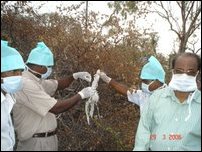Current Drugs May Be Useless Against H5N1

This is a no-brainer, really, as Tamiflu resistant H5N1 strain already exists (although the post I blogged about it didn't have a link...), but it's pretty scary because it's not exactly easy to just whip up new antivirals. Anyway, here's what the WHO has to say, according to the Herald Tribune:
"New drugs are needed to treat the H5N1 strain of bird flu, which has killed at least 148 people, because of the possibility that it could mutate and develop resistance to the most effective anti-viral medicines, a WHO scientist said Thursday.
"We know that there are (H5N1) viruses that are circulating that are resistant to these drugs, and so there is an urgent need to look at other anti-viral avenues," said Mike Perdue, a team leader with WHO's influenza program who took part in a two-day bird flu conference earlier this week sponsored by the U.N. health body.
Oseltamivir and amantadine, sold as Tamiflu and Symmetrel respectively, are the only known effective treatments for people who have contracted the virus. But there have been isolated instances in Asia where infected patients did not respond to the drugs.
"We know from surveillance studies and from hospital clinical studies that resistance to the two primary anti-viral drugs, the Tamiflu and amantadine drugs, has already occurred," said Perdue. The limited number of identified resistant strains, however, are not yet numerous enough to suggest a larger trend in H5N1 resistance.
Another concern for scientists is whether a vaccine can be developed to immunize humans against the virus. No such vaccine yet exists, but there are some promising candidates."We've never seen the kinds of human infections with avian influenza viruses that we see with H5N1. We assume there are some unique genetic attributes of this virus that are allowing it to be so pathogenic in humans and to cause such high mortality," said Perdue."
---------------------------------------------------------
So if it doesn't act like other avian influenza, how do we know it's virulence will drop when it moves to humans? How does highly-pathogenic H5N1 affect birds, it's natural host? According to the CDC it kills 90-100% of the birds infected within a few days, affecting multiple organs.
I've told you all time and time again about how this thing kills birds: blood sweating, pustules, exploding heads...
And our drugs can't stop it.






No comments:
Post a Comment